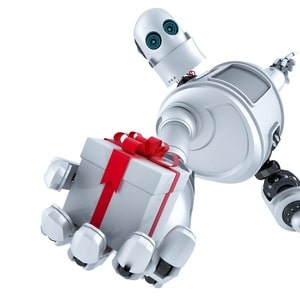 Many marketing pundits - including us - insist that human interactions are essential in maintaining strong customer relationships. Automate everything, we insist, and you'll simply reduce customer relationships to their bare transactional bones, with little to no opportunity to build emotional loyalty through the customer experience. We insist that this is so - and then along comes some consumer research that appears to abrogate these findings. Or not - with consumer research most often framed to pursue the funding company's sales agenda, a grain of salt is always required. Still, it's always a good idea to occasional put your most cherished assumptions to the test. By Rick Ferguson
Many marketing pundits - including us - insist that human interactions are essential in maintaining strong customer relationships. Automate everything, we insist, and you'll simply reduce customer relationships to their bare transactional bones, with little to no opportunity to build emotional loyalty through the customer experience. We insist that this is so - and then along comes some consumer research that appears to abrogate these findings. Or not - with consumer research most often framed to pursue the funding company's sales agenda, a grain of salt is always required. Still, it's always a good idea to occasional put your most cherished assumptions to the test. By Rick Ferguson
The research in question comes courtesy of Inc. contributor Chris Matyszczyk, who apparently received a sneak preview of an airline consumer research study from in-app customer experience company Helpshift. The survey of 2,000 consumers revealed the following tidbits about how airline customers view the flying experience:
- 74 percent "insisted that the Trump administration is making flying more difficult. They cited increased chaos and uncertainty at airports, as well as the administration's laptop ban."
- 42 percent of frequent flyers use airline apps.
- 95 percent of frequent flyers believe airline apps improve the flying experience.
- 29 percent of airline loyalty program members say "they prefer apps because it's easier to make a complaint through them than attempt to talk to a human being."
- 19 percent of airline loyalty program members said they used apps because "the apps were smarter than airline employees."
- 17 percent of airline loyalty programs members said they used apps because "they don't like interacting with people."
These last three stats are rather astounding, when you think about it: approximately one out of every five frequent-flyers believe that the human interactions they experience when flying are so bad that they prefer automation. Money quote from Matyszczyk:
"...it seems that many frequent fliers have already given up on the humans who work for airlines and happily choose the machines. They don't believe humans can be helpful. Some even question their intelligence. Of course, this will only encourage airlines to continue to replace humans with machines. But at what point does that entirely depersonalize something that used to be about customer service?"
Exactly! There are many unanswered questions here - without access to the cross-tabs, we can't draw any solid conclusions about the Helpshift research. One in five frequent-flyers isn't a tremendously awful number, so perhaps four in five flyers think that airline customer service is just fine. If we take Matyszczyk's interpretation of the survey results at face value, however, we are left with two possibilities: that either customer service automation really is that adept at providing a superior experience; or that airline customer service has been so historically poor that they've trained significant numbers of their presumably best customers to avoid interacting with airline employees whenever possible.
Either way, if these survey findings are indicative of any larger trend, then we might expect to see a snowball effect in customer service automation as more customers choose apps over humans, which provides evidence to the airlines that their customers prefer automation, which in turn spurs further automation. Eventually, there are no humans with whom to interact. The flying experience - with the possible exception of the in-flight experience itself - becomes completely devoid of human interactions.
Extrapolate this scenario beyond the airlines - easy to do, since retailers, grocers, quick-service restaurants, banks, and many other consumer-facing businesses are currently racing to replace their front-line employees with apps, kiosks, and self-service checkouts - and we may envision a future in which human interactions with the brands and businesses with whom we interact daily become largely extinct. Add in Amazon, voice-activated ordering, and the Internet of Things, and we face a future in which our brand relationships are driven almost entirely by algorithms and automated user interfaces.
Whether this future feels like utopia or dystopia depends largely on your point of view. For companies, automation represents bottom-line cost savings. For consumers, it depends on how much you love apps or how little you love customer service reps. In the automated future, there will be winners and losers.
It isn't difficult to believe, however, that we'll lose something important in a world largely devoid of humanity. What happens when we reach a new level of parity, in which every competing brand is delivering roughly the same personalized, automated, and frictionless experience? How will brands then differentiate themselves in a world in which interactions become utterly impersonal and transactional?
We don't want to sound like Luddites here. If we were to place our money on any bet about the future, however, we'd place it on those companies that leverage technology and automation to support and enhance human interactions, rather than replace them. That's a future that we can all bank on.
Rick Ferguson is CMO and Editor in Chief of the Wise Marketer Group.




